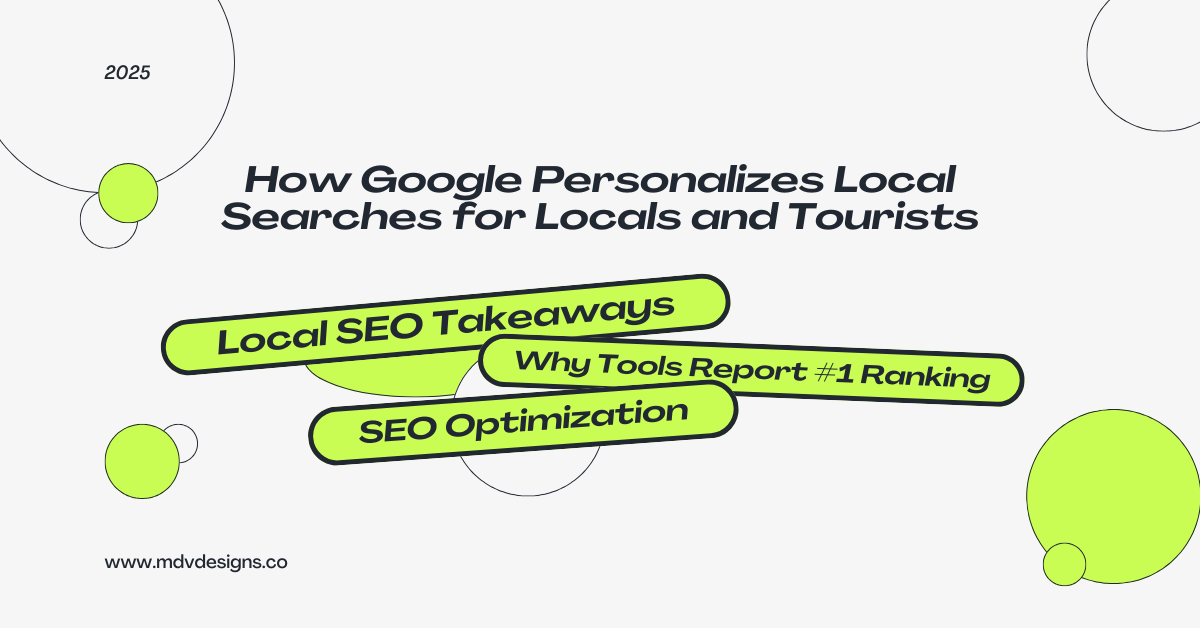The central question for any business investing in SEO optimization is this:
how can we be sure that our keywords are in the first position all the time, for every user?
The honest answer is no. Google personalizes results based on location, search history, and user behavior. This means absolute #1 ranking for every individual is impossible nowadays.
Does this mean we need to give up on SEO optimization? Zero. Not at all. It just means we use it differently.
Instead of expecting perfection, we focus on maximizing average visibility and dominating relevant searches for most users.
For example, if a restaurant in Valletta appears as the first result seventy percent of the time according to tools like Google Search Console, it is still considered a number one keyword.
This does not guarantee that every user sees it first, but it is a strong signal of market dominance.
This case study in Malta illustrates how local SEO and personalization intersect and how businesses can approach optimization intelligently.
Key Takeaways:
- Google personalizes search results based on location, search history, and user preferences.
- Local residents and tourists in Malta may see different results even for the same keywords such as “restaurant Valletta”.
- Tools like Google Search Console or third-party SEO apps show average positions, not absolute rankings for all users.
- Optimizing for local SEO is still valuable, but rankings should be interpreted differently.
How Google Personalization Works
Google personalizes search results using several key signals:
- Google: heavily weighs geographic location. For local searches such as “near me” or city-specific queries, proximity to the business is the strongest factor
- Search History: Past searches, clicks, and general browsing behavior can slightly nudge rankings in favor of preferred cuisines or styles. For example, a user who frequently searches for Italian restaurants may see Italian options higher in their results
- Device and Language: Searches from mobile devices or specific languages can alter the order of listings slightly.
Even tourists visiting Malta without local search history are subject to these rules.
While their current location dominates results, Google may still subtly integrate past preferences from their home country, such as boosting pasta or pizza restaurants.
Why Tools Report #1 Ranking
Tools like Google Search Console and third-party SEO softwares like SemRush do not see the personalized results of every user. Instead, they measure:
- Average position across neutral searches
- Share of impressions where the listing appears first
- Market dominance for a keyword in a broader, standardized sense
So when a tool says a restaurant ranks number one seventy percent of the time, it is not an exact guarantee for every visitor.
Instead, it shows that the business is consistently among the top listings for most users. This is how businesses interpret rankings practically and still make SEO optimization decisions.
Practical Local SEO Takeaways for Local Businesses
- Google My Business: Ensure your Google Business Profile, reviews, and website are optimized for local relevance
- Content Relevance: Create content that matches search intent, for example menus, opening hours, or blog posts about local specialties
- Use Ranking Data Strategically: Treat average positions and impression shares as indicators, not absolutes. This allows you to improve visibility without expecting perfection
- Cater to Both Locals and Tourists: Your SEO strategy should consider both groups, as their search behavior may differ
Conclusion
The Malta case study shows that even though Google personalizes results for locals and tourists, businesses can still leverage SEO optimization effectively.
Absolute first position is impossible, but focusing on average visibility, impression share, and local relevance ensures your business appears consistently at the top for most users.
By understanding how Google personalization works and interpreting SEO tools correctly, you can dominate local searches without expecting perfection. SEO optimization remains a powerful tool when used strategically.
But even knowing how to optimize your website may not be enough if you do not have the time to dedicate to it. This is completely understandable, as running your own business takes priority.
That is where we come in. Our team leverages years of experience and proven strategies from helping numerous clients improve their search rankings to boost the visibility of your business as well.
If you would like to learn more, feel free to get in touch with us. We would be delighted to help start improving your website’s position in search results and drive more traffic to your business.
FAQ
Q: Will tourists see the same top restaurants as locals?
A: Not always. Location dominates, but Google may subtly factor in past preferences, causing slight differences
Q: Can we ever be first for all users?
A: No. Absolute first position for every user is impossible because of personalization, but you can dominate the majority of searches
Q: Does being number one in SEO tools guarantee everyone sees you first?
A: No. Tools show average positions and market dominance. Seventy percent first impressions are still valuable for business decisions
Q: What is the most important factor for local SEO in Malta?
A: Optimizing your Google Business Profile, local keywords, reviews, and relevance for nearby searches




